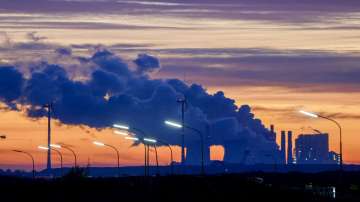Developed nations have enjoyed the fruits of energy and they will need to go for net-zero (emissions) faster so that developing nations have some carbon space, India asked developed nations ahead of the COP26 climate meet.
Speaking to media over the outcomes of the G20 Summit in Rome, India's Sherpa to G20 Summit and Union Minister Piyush Goyal said, "First of all what we have decided is global net zero. So all the countries put together will be net-zero which means the developed countries, which have already enjoyed the fruits of low-cost energy for several years have to go in for net-zero much faster and if possible going for net-negative so that they can release policy space and some carbon space for the developing countries to pursue their developing agenda."
"Second, in terms of the year, we still have to work on technological solutions... there are no available adequate technologies to be able to absorb large amounts of clean energy into the grids and maintain grid stability, therefore, we will have to look at more technology and innovation playing an important before we can identify a year," he added.
On being asked how much funds will India require to pursue clean energy, Goyal said, "For our base load to be replaced from coal to maybe nuclear, we will need large amounts of capital to set up nuclear plants, both to replace our current demand and future demand that our development imperative requires."
Also, "we need to be a member of the nuclear supplier's group to ensure adequate availability of raw material for nuclear supply and several other associated concerns around the cost of power," Piyush Goyal said.
"Energy and climate were clearly the center stage of our discussion. India and many other developing countries pushed for safeguarding the interest of the developing world. We're also joined by developed countries to increase the ambition from current levels of commitment," he mentioned.
"We got into text which confirms that developed world has acknowledged that they have not done enough in terms of meeting their commitments and that they'll have to move forward in providing finance, technology, and enablers to make this transition to a clean energy world," he added.
On the Agriculture front, Piyush Goyal said, "livelihoods for small & marginal farmers were the focus of our discussions. Everybody has agreed that improving their livelihoods is an important global effort that we'll have to put in."
ALSO READ | 'Our last, best hope to keep 1.5 degrees in reach': COP26 President as climate summit opens in Glasgow
ALSO READ | India, UK to launch global solar project 'Green Grids Initiative' at COP26
Latest India News
